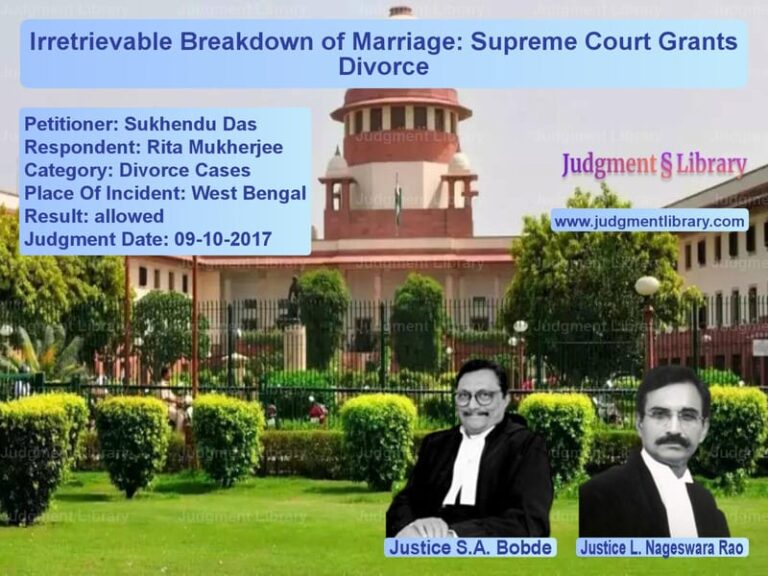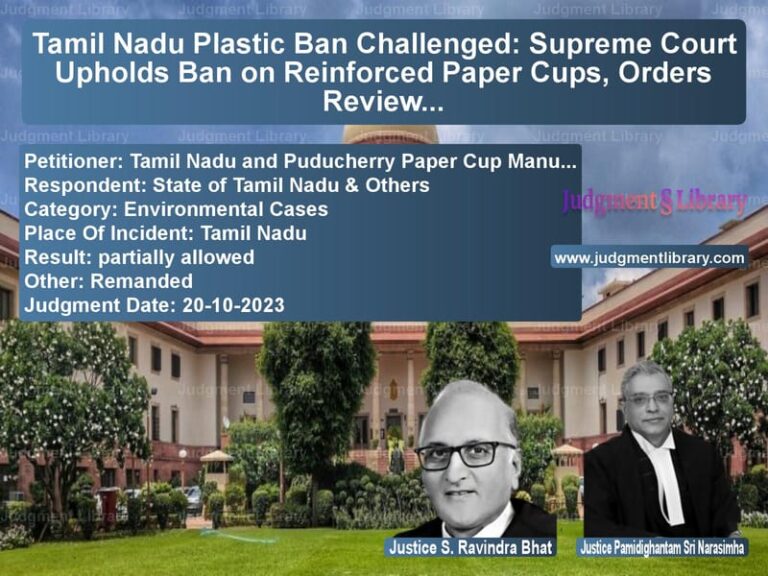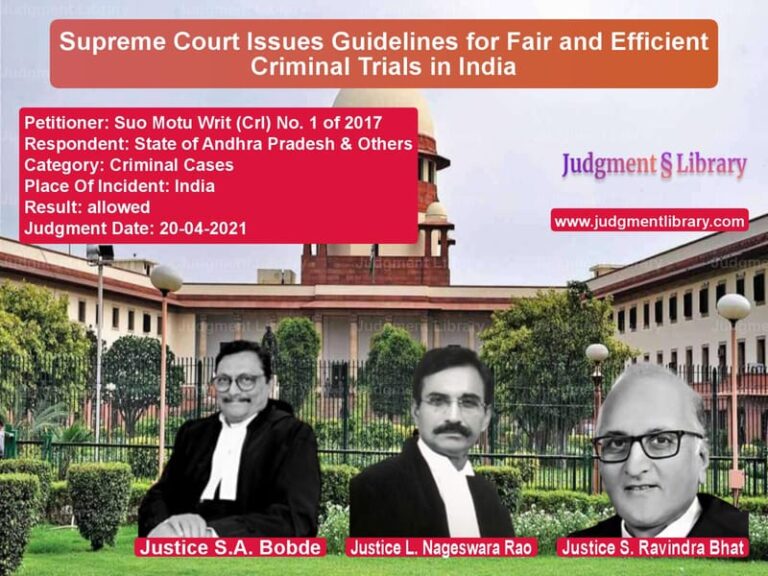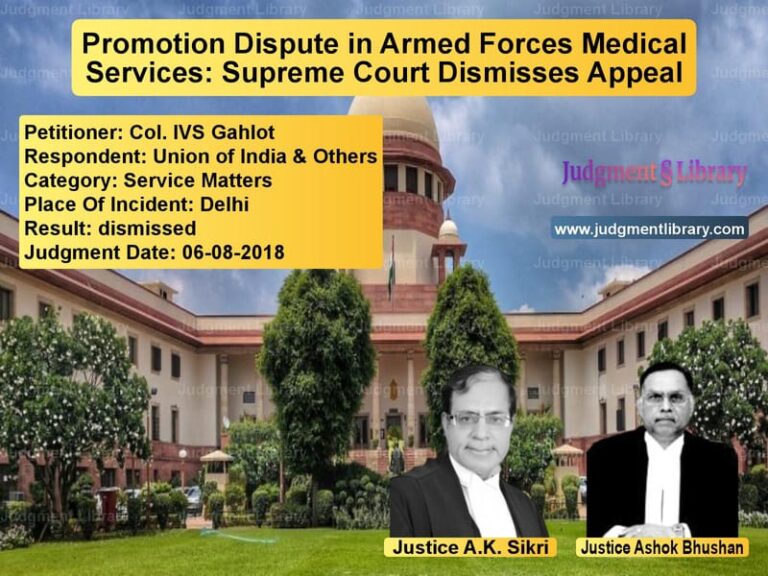Fraudulent Disability Certificates: Supreme Court Allows Verification by Medical Board
The case of State of U.P. & Ors. vs. Ravindra Kumar Sharma & Ors. is a significant judgment concerning the verification of disability certificates issued under the Persons with Disabilities (Equal Opportunities, Protection of Rights and Full Participation) Act, 1995. The Supreme Court addressed the legality of re-verification of disability certificates by the Medical Board, following complaints about fraudulent claims under the reserved quota for disabled candidates.
Background of the Case
The respondents in this case applied for the Basic Teacher Certificate (BTC) training course under the physically handicapped category. They were selected based on disability certificates issued under the Persons with Disabilities (Equal Opportunities, Protection of Rights and Full Participation) Rules, 1996. Upon completing their training, they were offered appointments in primary schools managed by the state government.
However, a complaint was filed by Bhartiya Viklang Sangh, alleging that several candidates fraudulently obtained disability certificates to claim reservation benefits. Following the complaint, the State Government issued an order on November 3, 2009, directing the formation of a fresh Medical Board to verify the authenticity of the disability certificates.
As a result of this verification process:
- 234 candidates were assessed.
- It was found that 21% of the candidates were not actually disabled despite possessing disability certificates.
Subsequently, the Director, State Council for Educational Research & Training, issued a communication on July 15, 2010, instructing all selected candidates to appear before the newly constituted Medical Board for re-assessment of their disabilities.
Legal Challenge in the High Court
The affected candidates challenged the verification process before the Allahabad High Court, arguing that the state had no authority to question a disability certificate once issued under the Rules of 1996. They contended that a re-examination violated their rights and amounted to an unjustified review.
The Single Bench of the High Court dismissed the petition, upholding the State Government’s authority to verify the disability status of candidates based on a genuine suspicion of fraud. The court reasoned that:
- The Rules of 1996 allowed for a review of disability certificates.
- The government had the right to impose conditions for verifying eligibility.
- Disability certificates were not final and could be reviewed if necessary.
However, the matter was taken to the Division Bench of the High Court, which ruled in favor of the candidates. The Division Bench held that:
- Once a certificate is issued under the 1996 Rules, it cannot be reopened unless there is concrete proof of fraud.
- The government could conduct only a physical verification to check if the candidate held a valid certificate.
- Fresh medical examinations could be conducted only if it was found that the candidate never possessed a disability certificate or if the disability was misrepresented.
This decision restricted the State Government’s ability to conduct an independent medical re-assessment of disability status.
Arguments Before the Supreme Court
The State of Uttar Pradesh challenged the High Court’s Division Bench ruling in the Supreme Court, arguing that:
- There was substantial evidence of fraud in the issuance of disability certificates.
- The government had the authority to verify whether individuals falsely claimed reservations meant for disabled persons.
- Since 21% of the candidates were found to be ineligible under the disabled category, re-verification was justified.
The respondents (affected candidates) contended that:
- The government had no right to interfere with certificates already issued under the 1996 Rules.
- The verification process was arbitrary and amounted to harassment.
- The only valid form of verification was checking whether a candidate actually possessed a certificate, rather than questioning its validity.
Supreme Court’s Judgment
The Supreme Court overturned the Division Bench’s ruling and held in favor of the State Government, allowing re-verification of disability certificates. The Court made the following key observations:
- Fraud vitiates everything: If fraud is detected in obtaining disability certificates, the government has the right to take corrective measures.
- Certificates are not absolute: A disability certificate is not final and can be reviewed if there is substantial evidence of misrepresentation.
- Medical re-verification is justified: The Court permitted a fresh medical examination for candidates whose certificates were suspected to be fraudulent.
The judgment cited various precedents reinforcing the principle that fraud nullifies any legal benefit obtained, including:
- Bhaurao Dagdu Paralkar v. State of Maharashtra (2005) 7 SCC 605 – Fraud unravels everything, and any order obtained through fraud is void.
- Ram Chandra Singh v. Savitri Devi (2003) 8 SCC 319 – A fraudulent misrepresentation invalidates even the most solemn proceedings.
- Express Newspapers (P) Ltd. v. Union of India (1986) 1 SCC 133 – Fraud on power voids an order if it is not exercised in good faith.
Accordingly, the Supreme Court ruled:
“In cases where there is genuine suspicion of fraud, the government is well within its rights to re-examine disability certificates. The decision of the Division Bench restricting medical verification is incorrect, as it would perpetuate fraud and allow ineligible persons to continue benefitting from disability reservations.”
The Supreme Court directed the state to:
- Issue show cause notices to affected candidates before taking action.
- Complete the re-verification process within four months.
Key Legal Takeaways
- Fraud Nullifies Legal Benefits: A person who obtains a benefit fraudulently cannot claim any legal protection for it.
- Disability Certificates Can Be Reviewed: Even if issued under valid rules, disability certificates can be subjected to verification if fraud is suspected.
- Government Has a Duty to Ensure Fairness: The government must ensure that reservation benefits reach genuinely disabled persons.
- Judicial Oversight Is Essential: Courts must balance protection against government overreach while ensuring fairness in affirmative action policies.
Conclusion
The Supreme Court’s ruling in this case establishes a precedent that disability certificates are not beyond scrutiny. While protecting the rights of genuinely disabled individuals, the judgment ensures that fraudulent claims do not dilute the benefits meant for deserving candidates. The decision strengthens the integrity of the reservation system and reinforces the principle that fraud cannot be used to claim government benefits.
Don’t miss out on the full details! Download the complete judgment in PDF format below and gain valuable insights instantly!
Download Judgment: State of U.P. & Ors. vs Ravindra Kumar Sharm Supreme Court of India Judgment Dated 03-02-2016-1741852443589.pdf
Direct Downlaod Judgment: Direct downlaod this Judgment
See all petitions in Recruitment Policies
See all petitions in Public Sector Employees
See all petitions in Employment Disputes
See all petitions in Judgment by M.Y. Eqbal
See all petitions in Judgment by Arun Mishra
See all petitions in allowed
See all petitions in Quashed
See all petitions in supreme court of India judgments February 2016
See all petitions in 2016 judgments
See all posts in Service Matters Category
See all allowed petitions in Service Matters Category
See all Dismissed petitions in Service Matters Category
See all partially allowed petitions in Service Matters Category







